HARVEY NOW READY TO HIT GALLERIA THEATER A WEEK LATER THAN EXPECTED 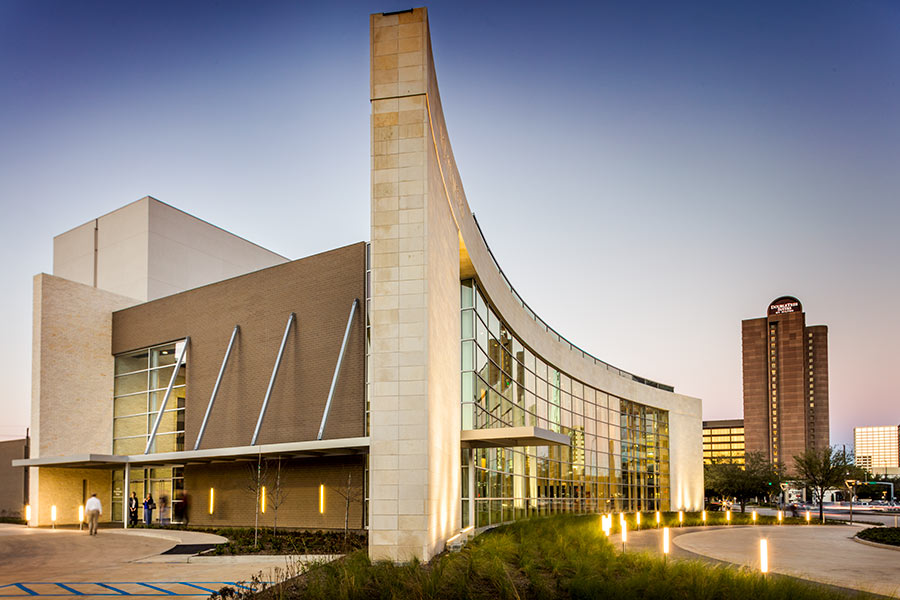 Opening night for Mary Chase’s 1945 Pulitzer Prize–winning play Harvey at the Jeannette and L.M. George Theater is now set for September 15th — just a week after its originally scheduled opening date was preempted by a downgraded Hurricane bearing the same name. The A.D. Players‘ brand-new playhouse at 5420 Westheimer, just west of the Galleria, did not flood and suffered only “minor leaks” from the storm, but in the immediate aftermath of Hurricane Harvey the theater-ministry group announced a decision to postpone its season-opening production, which stars an invisible rabbit named Harvey. New executive director Jake Speck says some new “arts-access and fundraising initiatives” will be announced soon. [A.D. Players; American Theatre; previously on Swamplot] Photo of George Theater: A.D. Players
Opening night for Mary Chase’s 1945 Pulitzer Prize–winning play Harvey at the Jeannette and L.M. George Theater is now set for September 15th — just a week after its originally scheduled opening date was preempted by a downgraded Hurricane bearing the same name. The A.D. Players‘ brand-new playhouse at 5420 Westheimer, just west of the Galleria, did not flood and suffered only “minor leaks” from the storm, but in the immediate aftermath of Hurricane Harvey the theater-ministry group announced a decision to postpone its season-opening production, which stars an invisible rabbit named Harvey. New executive director Jake Speck says some new “arts-access and fundraising initiatives” will be announced soon. [A.D. Players; American Theatre; previously on Swamplot] Photo of George Theater: A.D. Players
Quicklink
COMMENT OF THE DAY: THE GREAT RESETTLEMENT  “I suspect you’ll start seeing ‘Didn’t flood in Harvey’ as a selling point in future real estate listings, which will drive up the land values, and drive the poor out to the flooded areas (which is par for the course). It’s no wonder that happened, though. Many of the oldest neighborhoods in Houston are also predominately minority. And the oldest neighborhoods (read, first settled) are the highest points in Houston. After all, who is going to settle in a lowland when the ‘highlands’ are still available?” [Chris C., commenting on Our Place Never Flooded] Illustration: Lulu
“I suspect you’ll start seeing ‘Didn’t flood in Harvey’ as a selling point in future real estate listings, which will drive up the land values, and drive the poor out to the flooded areas (which is par for the course). It’s no wonder that happened, though. Many of the oldest neighborhoods in Houston are also predominately minority. And the oldest neighborhoods (read, first settled) are the highest points in Houston. After all, who is going to settle in a lowland when the ‘highlands’ are still available?” [Chris C., commenting on Our Place Never Flooded] Illustration: Lulu
COMMENT OF THE DAY RUNNER-UP: TRUST, BUT VERIFY  “My home didn’t flood, though a few blocks away, others did. I wonder if we could get a ‘Certificate of Nonflooding’ or some such official thing. I always laugh when I see a home listing with the words ‘Never flooded, per owner.’ Yeah, right!” [Gisgo, commenting on Metro Back in Service; Public Health Threats; A 12-Step Program for Houston’s Flooding Problem] Illustration: Lulu
“My home didn’t flood, though a few blocks away, others did. I wonder if we could get a ‘Certificate of Nonflooding’ or some such official thing. I always laugh when I see a home listing with the words ‘Never flooded, per owner.’ Yeah, right!” [Gisgo, commenting on Metro Back in Service; Public Health Threats; A 12-Step Program for Houston’s Flooding Problem] Illustration: Lulu
WANT TO JOIN SWAMPLOT’S VIRTUAL NEWSROOM? Are you a talented writer or journalist interested in helping out with Swamplot’s continuing coverage of Hurricane Harvey’s aftermath in Houston — and all that comes next? Swamplot has begun opening its editorial backchannel to a limited number of qualified reporters and interns interested in identifying, researching, and developing stories for the site. If you’re motivated to participate, please send us an email with the subject line “Newsroom help” and tell us why. Also tell us your editorial superpowers, your current availability and work situation, and include links to any relevant clips. If you’re not a journalist but want to help out, please send your photos, videos, and tips directly to the Swamplot tip line.
OUR PLACE NEVER FLOODED 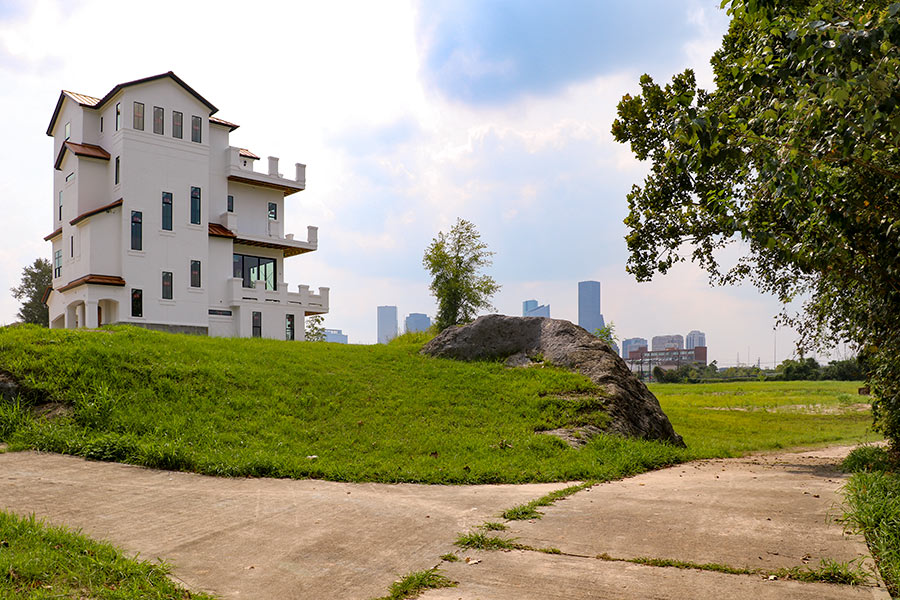 Cort MacMurray gazes into the city’s future: “. . . Houston is a cheerful amnesiac: We will rebuild in exactly the same places we built before, with exactly the same disrespect for historic floodplains. We are united, but in making this place stronger we’ll ignore fundamental inequities like school finance. We have a stronger work ethic than any other city in the Union, but when this crisis is past, we’ll slide back into affable indolence, trusting that everything is fine in our sprawling Xanadu on the Bayou.” [Houston Chronicle] Photo: Christof Spieler, via Swamplot Flickr pool
Cort MacMurray gazes into the city’s future: “. . . Houston is a cheerful amnesiac: We will rebuild in exactly the same places we built before, with exactly the same disrespect for historic floodplains. We are united, but in making this place stronger we’ll ignore fundamental inequities like school finance. We have a stronger work ethic than any other city in the Union, but when this crisis is past, we’ll slide back into affable indolence, trusting that everything is fine in our sprawling Xanadu on the Bayou.” [Houston Chronicle] Photo: Christof Spieler, via Swamplot Flickr pool
7 DAYS OF HARVEY BEFORE THE BRAZOS RIVER REACHES ITS SUGAR LAND PEAK 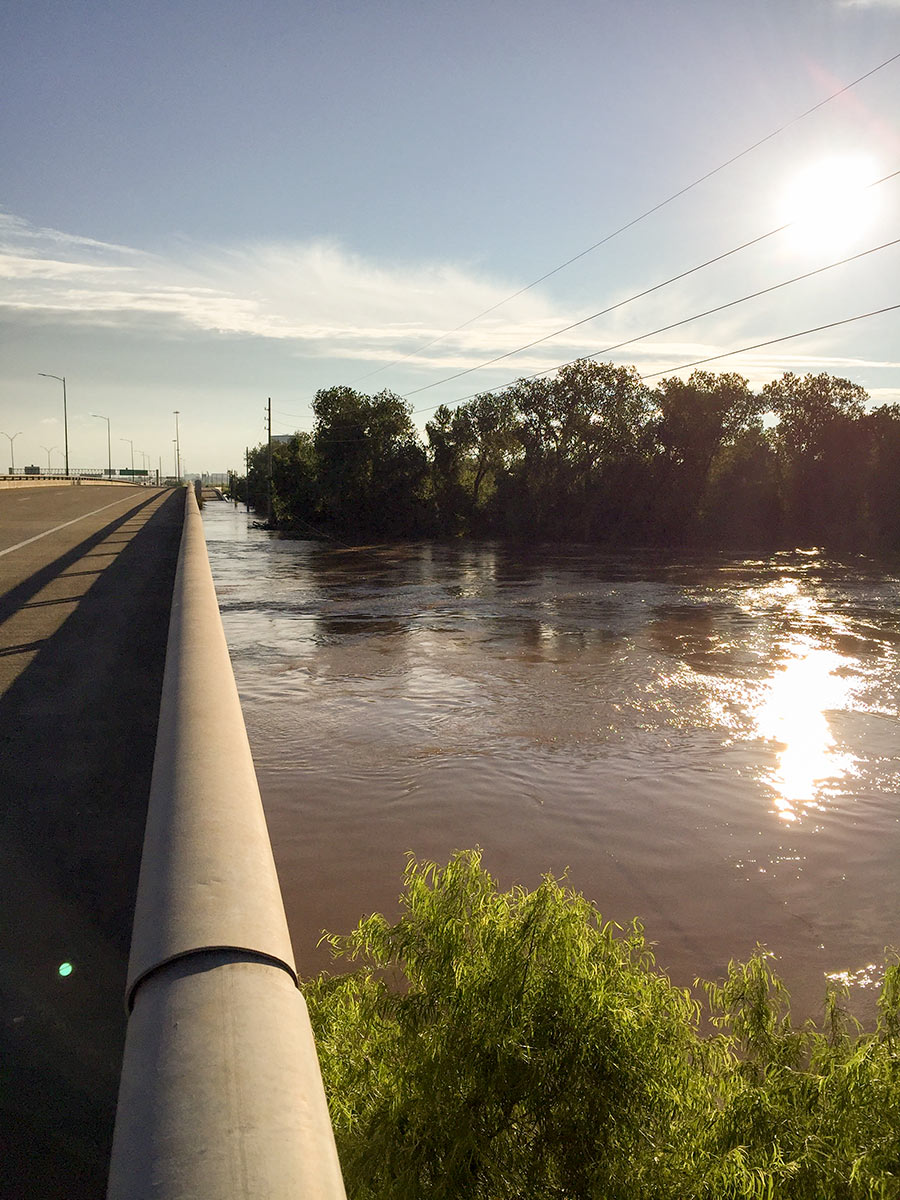 It wasn’t until early this morning that the Brazos River in Sugar Land and Richmond reached its highest level since area flooding triggered by Hurricane Harvey began. And it was a new record, reached at 5:15 am: 55.19 ft., according to the National Weather Service. The previous record, 54.7 ft. — surpassed Thursday at 1:30 am — was set by a flood last year on
It wasn’t until early this morning that the Brazos River in Sugar Land and Richmond reached its highest level since area flooding triggered by Hurricane Harvey began. And it was a new record, reached at 5:15 am: 55.19 ft., according to the National Weather Service. The previous record, 54.7 ft. — surpassed Thursday at 1:30 am — was set by a flood last year on Tax Day June 2nd. The photo here shows the river during a rare moment of sunshine a day earlier than that — from Hwy. 59 where Greatwood, Riverpark, Telfair, and Sugar Land Memorial Park meet. [Houston Chronicle] Photo: Grace Carlson
COMMENT OF THE DAY: THE RISKY GAME HOUSTON’S BEEN PLAYING ALL THESE YEARS  “It is really amazing to look at the total disaster that Harvey caused (And Ike. And Allison. And the Tax Day flood. And the Memorial Day flood.) and say to developers and regulators in the Houston area, “Doing a heck of a job, Brownie.†Developers and regulators built thousands of homes and strip malls all across Houston during the boom cycles of the ’60s, ’70s, and early ’90s that had completely insufficient stormwater drainage infrastructure. Regulators allowed people to build too close to flood zones and builders did not think twice about building right up to bayous and rivers. The response from regulators was to require better development practices moving forward in some areas and apply a few band aids in other areas. This lax development attitude worked for a long time because it helped keep housing relatively affordable compared to other large metro areas. But after Harvey, people looking to come to Houston will have to consider whether the affordable housing and economic opportunities are worth the risk of losing everything in another big flooding event. The reassurance that developers are doing a better job with new projects does nothing to allay fears that existing housing is prone to devastating flooding. Houston’s failed development practices are now an albatross around the City’s neck.” [Old School, commenting on Comment of the Day: What Out-of-Town Reporters Don’t Understand About Houston-Area Development Regulations] Illustration: Lulu
“It is really amazing to look at the total disaster that Harvey caused (And Ike. And Allison. And the Tax Day flood. And the Memorial Day flood.) and say to developers and regulators in the Houston area, “Doing a heck of a job, Brownie.†Developers and regulators built thousands of homes and strip malls all across Houston during the boom cycles of the ’60s, ’70s, and early ’90s that had completely insufficient stormwater drainage infrastructure. Regulators allowed people to build too close to flood zones and builders did not think twice about building right up to bayous and rivers. The response from regulators was to require better development practices moving forward in some areas and apply a few band aids in other areas. This lax development attitude worked for a long time because it helped keep housing relatively affordable compared to other large metro areas. But after Harvey, people looking to come to Houston will have to consider whether the affordable housing and economic opportunities are worth the risk of losing everything in another big flooding event. The reassurance that developers are doing a better job with new projects does nothing to allay fears that existing housing is prone to devastating flooding. Houston’s failed development practices are now an albatross around the City’s neck.” [Old School, commenting on Comment of the Day: What Out-of-Town Reporters Don’t Understand About Houston-Area Development Regulations] Illustration: Lulu
HAPPY BELATED BIRTHDAY, HOUSTON, YOU LOVABLE, MISIDENTIFIED SWAMP 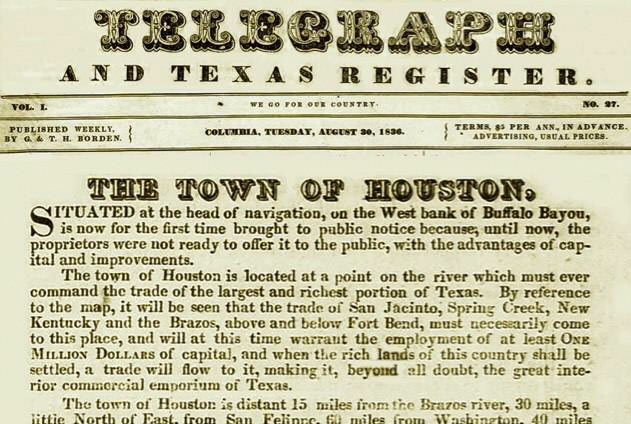 Possibly overlooked amid the Harvey hubbub: Yesterday was the City of Houston’s 181st birthday — or more accurately, the 181st anniversary of the launch of an advertising campaign announcing its establishment, pursued by the soon-to-be-city’s founding real-estate hucksters. “It is handsome and beautifully elevated,” the Allen Brothers wrote of the Houston they imagined in that ad, “salubrious and well watered, and now in the very heart or centre of population, and will be so for a length of time to come.” [Previously on Swamplot] Image: Houstorian
Possibly overlooked amid the Harvey hubbub: Yesterday was the City of Houston’s 181st birthday — or more accurately, the 181st anniversary of the launch of an advertising campaign announcing its establishment, pursued by the soon-to-be-city’s founding real-estate hucksters. “It is handsome and beautifully elevated,” the Allen Brothers wrote of the Houston they imagined in that ad, “salubrious and well watered, and now in the very heart or centre of population, and will be so for a length of time to come.” [Previously on Swamplot] Image: Houstorian
SMELLING BLIND IN THE EAST END 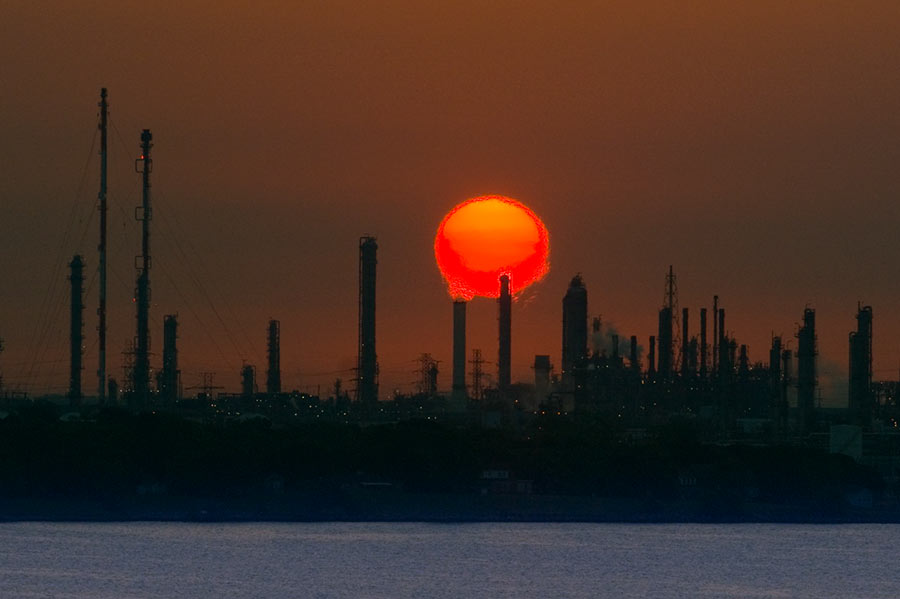 A possible cause of the nasty smells that caused East End residents headaches, sore and scratchy throats, and itchy eyes as Hurricane Harvey approached and inundated the area? Houston-area industrial plants in the last week released more than 2.25 million pounds of emissions above legal limits, according to an Environment Texas tally of Texas Commission on Environmental Quality data. The reason: plant shutdowns before the onset of the storm and startups after it left. “So far,” writes Emily Atkin, “TCEQ has not indicated these events have triggered health impacts. . . . TCEQ Media Relations Manager Andrea Miller told me the agency or local emergency officials would contact residents if an immediate health threat were to occur. What’s more, Miller said companies were probably reporting higher emissions that what actually occurred, ‘since underreporting can result in higher penalties.‘ It’s unclear, however, how TCEQ would check many of the companies’ reports, since the agency turned off all its air quality monitors in the Houston area before Harvey hit. Miller confirmed as much on Monday, saying devices were either turned off or removed “to protect against damage or loss of these sensitive and expensive instruments.†[The New Republic] Photo of ExxonMobil Baytown refinery: Louis Vest [license]
A possible cause of the nasty smells that caused East End residents headaches, sore and scratchy throats, and itchy eyes as Hurricane Harvey approached and inundated the area? Houston-area industrial plants in the last week released more than 2.25 million pounds of emissions above legal limits, according to an Environment Texas tally of Texas Commission on Environmental Quality data. The reason: plant shutdowns before the onset of the storm and startups after it left. “So far,” writes Emily Atkin, “TCEQ has not indicated these events have triggered health impacts. . . . TCEQ Media Relations Manager Andrea Miller told me the agency or local emergency officials would contact residents if an immediate health threat were to occur. What’s more, Miller said companies were probably reporting higher emissions that what actually occurred, ‘since underreporting can result in higher penalties.‘ It’s unclear, however, how TCEQ would check many of the companies’ reports, since the agency turned off all its air quality monitors in the Houston area before Harvey hit. Miller confirmed as much on Monday, saying devices were either turned off or removed “to protect against damage or loss of these sensitive and expensive instruments.†[The New Republic] Photo of ExxonMobil Baytown refinery: Louis Vest [license]
HOW IT LOOKS FROM THE DRY SIDE OF THE BAYOU 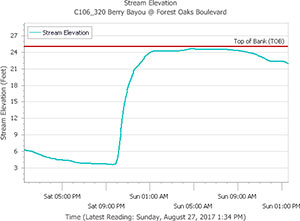 Chronicle features editor Lisa Gray says her Meadowcreek Village home escaped water damage during the flood, but it was close — and many others weren’t so lucky: “Berry Bayou — the middle of which forms my back property line,” she writes, “received more than 45 in. I’ve seen it in national weather-nerd articles where people are marveling how fast a bayou can rise. My husband says we were half an inch away from the bayou coming out of its bank in our back yard. He sent a graph, showing that on Saturday night, at the monitor I can see from my back yard, it was literally at bank level. But the water broke first on the other bank, into the yard of one of my favorite people in the neighborhood, and up and down the yards on that side. Lots of houses flooded. ‘Dry privilege’: That’s the headline of the essay I ought to write.” [Previously on Swamplot]Â Graph of Berry Bayou water levels at Forest Oaks Blvd. on August 26th and 27th: Harris County Flood Control District
Chronicle features editor Lisa Gray says her Meadowcreek Village home escaped water damage during the flood, but it was close — and many others weren’t so lucky: “Berry Bayou — the middle of which forms my back property line,” she writes, “received more than 45 in. I’ve seen it in national weather-nerd articles where people are marveling how fast a bayou can rise. My husband says we were half an inch away from the bayou coming out of its bank in our back yard. He sent a graph, showing that on Saturday night, at the monitor I can see from my back yard, it was literally at bank level. But the water broke first on the other bank, into the yard of one of my favorite people in the neighborhood, and up and down the yards on that side. Lots of houses flooded. ‘Dry privilege’: That’s the headline of the essay I ought to write.” [Previously on Swamplot]Â Graph of Berry Bayou water levels at Forest Oaks Blvd. on August 26th and 27th: Harris County Flood Control District
COMMENT OF THE DAY: WHAT OUT-OF-TOWN REPORTERS DON’T UNDERSTAND ABOUT HOUSTON-AREA DEVELOPMENT REGULATIONS 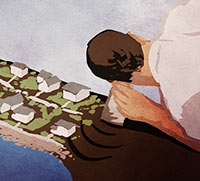 “. . . I must LOL whenever I see one of these articles blaming our flooding on our lack of zoning, and as an example of our lack of zoning, the article will show some subdivision in Sugar Land or Katy. Last time I checked, neither of those places are inside the city limits of Houston. Also, don’t those subdivisions have zoning up the ying yang? . . .” [XCellKen, commenting on Harvey’s Record Rainfall; Crosby Plant Explosion Risk; A Ponderosa Forest Boat Ride] Illustration: Lulu
“. . . I must LOL whenever I see one of these articles blaming our flooding on our lack of zoning, and as an example of our lack of zoning, the article will show some subdivision in Sugar Land or Katy. Last time I checked, neither of those places are inside the city limits of Houston. Also, don’t those subdivisions have zoning up the ying yang? . . .” [XCellKen, commenting on Harvey’s Record Rainfall; Crosby Plant Explosion Risk; A Ponderosa Forest Boat Ride] Illustration: Lulu
STUFF YOU PROBABLY SHOULD KNOW ABOUT THE ADDICKS AND BARKER RESERVOIRS 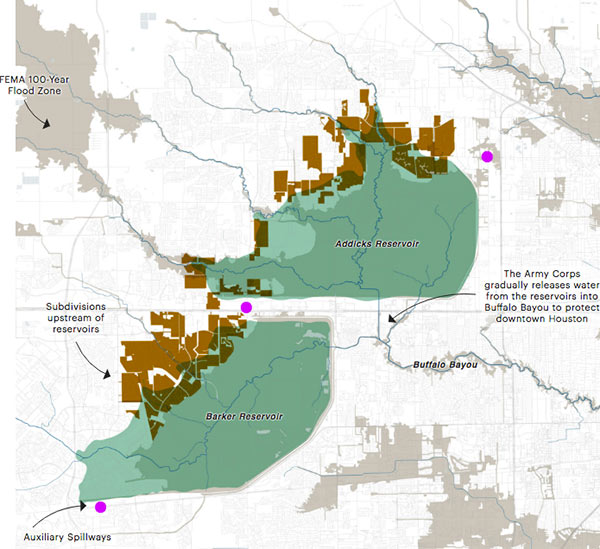 Lived in Houston for years but still coming up to speed on how the Addicks and Barker dams are supposed to work — just as the reservoirs reach to their highest-ever levels? This brief explainer from Kiah Collier and Neena Satija of The Texas Tribune Al Shaw and Lisa Song of ProPublica should overfill you with info: “As of now, the Army Corps says there’s enough excess water in the reservoirs that some of it will flow around (not overtop) these auxiliary spillways. . . . The Army Corps can’t say exactly what areas might experience additional flooding, but local officials listed 53 subdivisions in the Addicks watershed and 40 in the Barker watershed (shown in brown in the map above) at high risk of flooding. Jeremy Justice, a hydrologic analyst at the Harris County Flood Control District, said two subdivisions near the Addicks reservoir—Twin Lakes and Lakes On Eldridge—are particularly vulnerable to flooding from the Addicks spillway. Those homes ‘probably should never have been put there,‘ he said.” Thousands of homes around the reservoirs have now flooded — some because they’re close to rising bayous, and some because of bad neighborhood drainage, they write. “But many are flooding because they are in an area that the Army Corps actually considers to be inside the reservoirs. (See map.)” [Texas Tribune; ProPublica version with links; previously on Swamplot] Map: ProPublica
Lived in Houston for years but still coming up to speed on how the Addicks and Barker dams are supposed to work — just as the reservoirs reach to their highest-ever levels? This brief explainer from Kiah Collier and Neena Satija of The Texas Tribune Al Shaw and Lisa Song of ProPublica should overfill you with info: “As of now, the Army Corps says there’s enough excess water in the reservoirs that some of it will flow around (not overtop) these auxiliary spillways. . . . The Army Corps can’t say exactly what areas might experience additional flooding, but local officials listed 53 subdivisions in the Addicks watershed and 40 in the Barker watershed (shown in brown in the map above) at high risk of flooding. Jeremy Justice, a hydrologic analyst at the Harris County Flood Control District, said two subdivisions near the Addicks reservoir—Twin Lakes and Lakes On Eldridge—are particularly vulnerable to flooding from the Addicks spillway. Those homes ‘probably should never have been put there,‘ he said.” Thousands of homes around the reservoirs have now flooded — some because they’re close to rising bayous, and some because of bad neighborhood drainage, they write. “But many are flooding because they are in an area that the Army Corps actually considers to be inside the reservoirs. (See map.)” [Texas Tribune; ProPublica version with links; previously on Swamplot] Map: ProPublica
HARVEY UPSTAGES HARVEY  The A.D. Players‘ new 450-seat Jeannette and L.M. George Theater at 5420 Westheimer just west of the Galleria, which opened earlier this year, “has stood the storm well,” its operators report today on Facebook. But not so much the very first set of shows in the resident theater company’s new season: Because of Hurricane Harvey’s devastation, a production of Mary Chase’s 1945 Pulitzer Prize-winning play about a 6-ft., 3-and-a-half-in.-tall invisible rabbit named Harvey (scheduled to begin a 3-and-a-half-week run on September 8th) has been put off — for a while, at least: “Harvey the storm has not been our friend. ‘Harvey’ the show will go on — more details to come,” reads a note posted by the theater last night. “When it does, we want it to be a lighthearted lift to our beloved community, which has suffered so much in just a few short days.” The theater company began planning its production of Harvey months ago, but says it had been promoting the production “in earnest” for only a little more than a week. [A.D. Players] Photo of George Theater: A.D. Players
The A.D. Players‘ new 450-seat Jeannette and L.M. George Theater at 5420 Westheimer just west of the Galleria, which opened earlier this year, “has stood the storm well,” its operators report today on Facebook. But not so much the very first set of shows in the resident theater company’s new season: Because of Hurricane Harvey’s devastation, a production of Mary Chase’s 1945 Pulitzer Prize-winning play about a 6-ft., 3-and-a-half-in.-tall invisible rabbit named Harvey (scheduled to begin a 3-and-a-half-week run on September 8th) has been put off — for a while, at least: “Harvey the storm has not been our friend. ‘Harvey’ the show will go on — more details to come,” reads a note posted by the theater last night. “When it does, we want it to be a lighthearted lift to our beloved community, which has suffered so much in just a few short days.” The theater company began planning its production of Harvey months ago, but says it had been promoting the production “in earnest” for only a little more than a week. [A.D. Players] Photo of George Theater: A.D. Players
WHERE SWAMPLOT READERS CAN CHECK IN ON EACH OTHER AND SHARE THEIR HARVEY STORIES 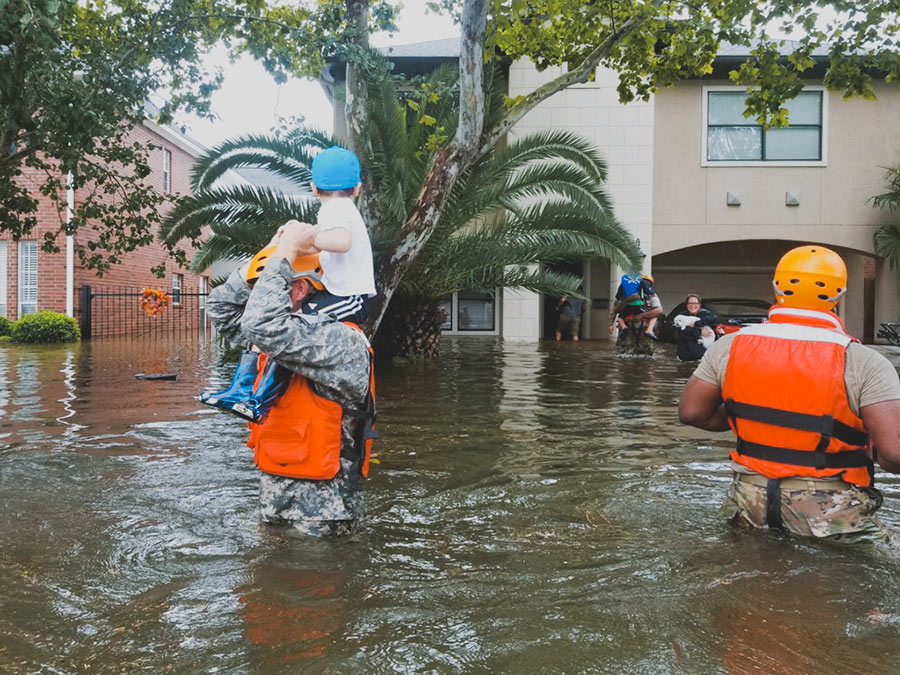 Got a story to share? Or just want to let folks on Swamplot — who might only know you by your commenting handle — know how you’ve been weathering the rising waters? No, the rains aren’t done yet, but if today or in the coming days you’d like a space to report on your experience or neighborhood, or just let everyone know if things are okay, please do so by adding a comment below. Photo:Â Lt. Zachary West , 100th Mobile Public Affairs Detachment [License]
Got a story to share? Or just want to let folks on Swamplot — who might only know you by your commenting handle — know how you’ve been weathering the rising waters? No, the rains aren’t done yet, but if today or in the coming days you’d like a space to report on your experience or neighborhood, or just let everyone know if things are okay, please do so by adding a comment below. Photo:Â Lt. Zachary West , 100th Mobile Public Affairs Detachment [License]
WHY YOU MIGHT WANT TO FILE YOUR HARVEY INSURANCE CLAIMS BEFORE FRIDAY 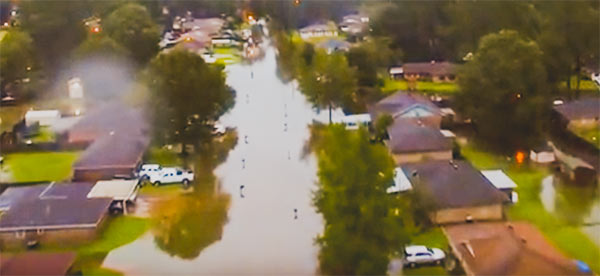 Suffered property damage from Hurricane Harvey and have access to a smartphone, computer, pen and paper, or your insurance agent? Forget about waiting for waters to recede before filing any insurance claim. You’ll want to do it now — or at least before Friday. What’s the rush? The new Texas law formerly known as House Bill 1774, passed by the Texas Legislature this session and signed by Governor Abbott in May, goes into effect on September 1. The “hailstorm lawsuit reform” measure reduces property owners’ leverage with insurance companies in weather-related claims — by making it more difficult for homeowners to sue agents successfully, increasing the obstacles to filing and carrying through with lawsuits over insurance coverage, and limiting the penalties insurance companies could face if they lose a lawsuit against you. To prevent your coverage from falling under these stipulations, notify your insurance provider of your claims before the law goes into effect, and document your correspondence. [Community Impact; Texas Tribune; Property Insurance Coverage Law Blog] Photo: Randy Poole
Suffered property damage from Hurricane Harvey and have access to a smartphone, computer, pen and paper, or your insurance agent? Forget about waiting for waters to recede before filing any insurance claim. You’ll want to do it now — or at least before Friday. What’s the rush? The new Texas law formerly known as House Bill 1774, passed by the Texas Legislature this session and signed by Governor Abbott in May, goes into effect on September 1. The “hailstorm lawsuit reform” measure reduces property owners’ leverage with insurance companies in weather-related claims — by making it more difficult for homeowners to sue agents successfully, increasing the obstacles to filing and carrying through with lawsuits over insurance coverage, and limiting the penalties insurance companies could face if they lose a lawsuit against you. To prevent your coverage from falling under these stipulations, notify your insurance provider of your claims before the law goes into effect, and document your correspondence. [Community Impact; Texas Tribune; Property Insurance Coverage Law Blog] Photo: Randy Poole

